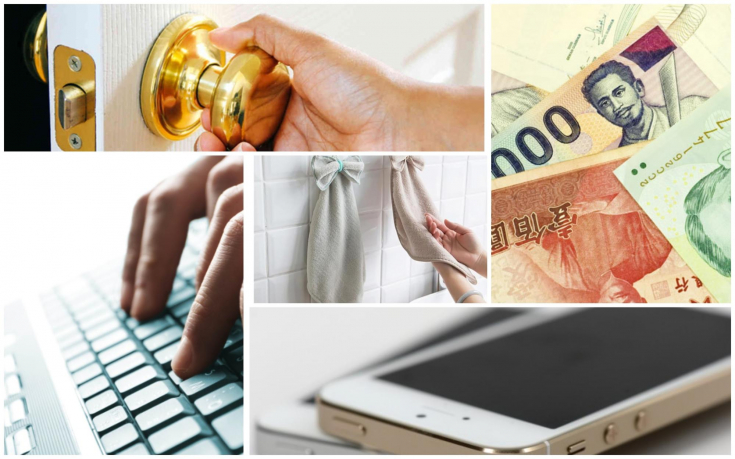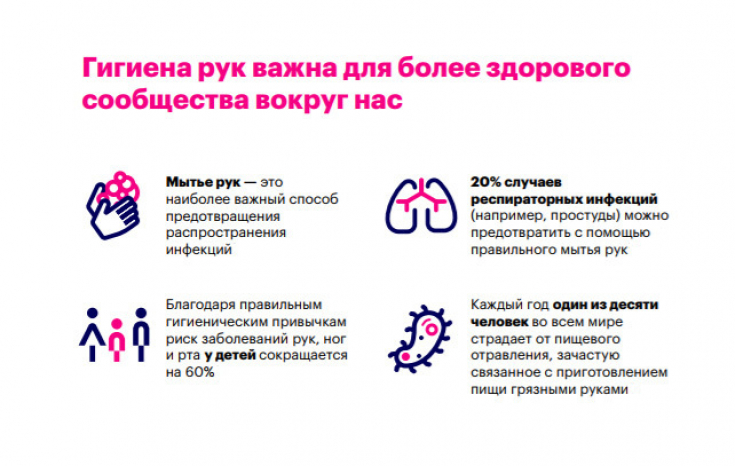The cause of most human diseases — microbes and bacteria. They surround us everywhere: in air, water, food. Some are classified as harmless, some are completely useful, but it it is better not to meet certain species. When the risk of catching a pathogenic microbe increases and how to avoid meeting these micro-pests, we will tell in this article. And if you think the dirtiest place —— it's a toilet rim, some of the facts will surprise you.
- "Household" microbes and bacteria: what microorganisms live in your home
- Top 5 places with maximum concentration of microorganisms
- Hygiene habits to help reduce the risk of infection
"Household" germs and bacteria: what microorganisms live in your house
Every millimeter of space in our homes is inhabited by microscopic living organisms. You will never completely destroy them and it — for the most part they are safe. Family members living in the same area for a long time "exchange" with their microflora and develop immunity to it.
Pathogenic microorganisms appear if the optimal microclimate parameters are not maintained (too dry / dusty / humid), or if they are brought from outside. In & nbsp; in this case, even in your own apartment you can "catch" germs and bacteria such as:
-
fungus;
-
E. coli;
-
streptococcus;
-
salmonella;
-
staphylococcus aureus.
The human immune system has been "learning" for centuries to resist microorganisms, otherwise we would simply disappear as a species. But for people who are immunocompromised, who have had chemotherapy or are taking immunosuppressants, it would be good to take some precautions. At a minimum, know in which places microbes and bacteria appear and develop most actively.

Read also: Hygiene products for clothing and shoes: basic rules
Top-5 places with maximum concentration of microorganisms
In during the day we contact hundreds of different things and the surface of every there are germs and bacteria. Below is a list of items familiar to us, the level of contamination of which simply rolls over.
Door handle
Every time you open the door to the office, store, your own room, or even the refrigerator door, you exposure billions of bacteria left behind by previous visitors. Experimentally, it was possible to prove that viruses "settled" in on the doorknob of an office, in 4 hours, they successfully infected half of the employees of a very large company. If possible, try to open the doors with your elbow or the back of your hand, and at home wipe the front door handle with an antiseptic wipe more often.
Smartphone
It turns out that a mobile device is 2 dirtier than a toilet bowl. And the most sophisticated phone can easily become a breeding ground for infections, no matter whatever the case. Have you held onto a handrail in the subway, opened the door in a hospital, and then answered a the phone phone send message? And now all those bacteria that were on hands have "settled" on the surface of the screen. Will you wash your hands, and phone? Don wipe the display with an alcohol-soaked cloth, at least once a week.
Money
In the course of research, it has been proven that up to one hundred species of microorganisms that cause diseases live on one banknote. In fact, this problem has been worrying doctors for a long time. In some countries, money is disinfected, for example, in Japan, ATMs do this. Other banknotes are coated with a bactericidal material. The dirtiest banknotes those whose denomination is smaller, they are more in go. Try to minimize cash payments, and after contact with money, wash your hands or wipe with antiseptic wipes.
Keyboard and mouse
These items also collect germs and bacteria from everyone who uses them. At the same time, the keyboard also becomes a breeding ground for dust mites and various mold fungi that love to settle in dust deposits and food debris between the buttons. Do not eat at the workplace clean — trite, but not unnecessary advice.
Towels
Bacteria are very fond of a humid and warm environment, so towels for them — ideal home. And considering that skin particles also remain on the tissue, there can be no doubt that all the conditions for the rapid development of colonies are met. Towels should be dried well and preferably not in the bathroom, but in the fresh air. Wash after 4 uses. Well and about the fact that everyone should have their own and not one thing has already been said repeatedly, but we recall.

And, by the way, one cannot fail to mention the toilet bowl, which, through the efforts of advertisers of household chemicals, seems to be almost a bacteriological weapon. In fact, microorganisms are uncomfortable there: the enamel is often rinsed with running water, does not absorb dirt, and is cleaned with aggressive agents. In addition, if no one in the family suffers from intestinal diseases, most likely, there will be no pathogenic bacteria in the toilet.
So, it turns out that a brand new iPhone can be "dirtier" toilet bowl.
Read also: Mysophobia: fear of germs or I fear what I can't see
Hygiene habits to help reduce the risk of infection
It's not worth fighting microorganisms and disinfecting everything in a row, but certain skills are still better to develop. In the period of a flu epidemic, for example, personal hygiene should be treated very carefully, since one sick person, sneezing, can infect others within a radius of 3 meters. A staphylococcus aureus remains on surfaces for for 12 hours, and under any conditions: rain, snow, sun — he does not care a straw. Therefore, it is better to try to minimize the chance of encountering microorganisms, and the following tips will help in this:
-
Try to wash your hands with soap whenever possible, or just rinse them with running water and treat them with antiseptic gel.
-
Avoid direct contact with objects that are touched by a large number of people. If this is not possible, get into the habit of wiping your hands with wet wipes, for example, after leaving the minibus or using the ATM.
-
Do not touch mucous membranes with dirty hands, do not rub your eyes. Try to avoid touching your face with your hands.
-
Ventilate the room, get rid of "dust collectors" (soft toys, thick carpets, etc.). Wipe your phone, remote, mouse, and keyboard with alcohol wipes at least once a week.
-
Disinfect kitchen items such as cutting boards with baking soda or vinegar solutions. They you can also wipe the door of the refrigerator, as well as drawers and shelves inside.

And remember that replacement— better disinfection. Change dish sponges, kitchen towels, washcloths, and toothbrushes regularly. Treatment with antiseptics, on the one hand, solves the problem, on the other — leads to the emergence of new, resistant species of microbes and bacteria. And, of course, do not forget about a healthy lifestyle, and then your immune system will be able to fight back any harmful microorganisms.
Read also: Personal hygiene: top 7 main mistakes
You might be wondering: How do you deal with imperfections in your appearance? Watch the video!






Add a comment